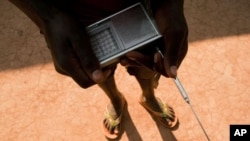WASHINGTON —
The government has denied arresting ordinary Zimbabweans in possession of shortwave radio sets, with acting permanent secretary in the Ministry of Justice Maxwell Ranga telling the African Commission on Human and People’s Rights that
Harare is targeting only gadgets thought to have been smuggled into the country.
Ranga was responding to a statement tabled by the Media Monitoring Project of Zimbabwe at the 53rd session of the African Commission on Human and People’s Rights this week.
Ranga said the government was arresting people who got radios from organizations that are believed to have smuggled them into the country, saying they violated laws relared to the clearance of goods by the Zimbabwe Revenue Authority. H
e accused NGO’s of stage-managing situations so they can have issues to report on.
The MMPZ and other NGOs present at the meeting in Gambia highlighted the situation on the ground in Zimbabwe, lamenting lack of access to information in the country.
In the statement, MMPZ said it believed that Zimbabwe’s citizens need to be informed and to make choices based on a wide variety of views.
They said such moves can only be achieved if “a free and diverse media environment exists and if restrictive laws abridging freedom of expression and the right to information are repealed.”
MMPZ senior advocacy officer Molly Chimhanda said NGOs want the commission to push Harare to implement media reforms.
Harare is targeting only gadgets thought to have been smuggled into the country.
Ranga was responding to a statement tabled by the Media Monitoring Project of Zimbabwe at the 53rd session of the African Commission on Human and People’s Rights this week.
Ranga said the government was arresting people who got radios from organizations that are believed to have smuggled them into the country, saying they violated laws relared to the clearance of goods by the Zimbabwe Revenue Authority. H
e accused NGO’s of stage-managing situations so they can have issues to report on.
The MMPZ and other NGOs present at the meeting in Gambia highlighted the situation on the ground in Zimbabwe, lamenting lack of access to information in the country.
In the statement, MMPZ said it believed that Zimbabwe’s citizens need to be informed and to make choices based on a wide variety of views.
They said such moves can only be achieved if “a free and diverse media environment exists and if restrictive laws abridging freedom of expression and the right to information are repealed.”
MMPZ senior advocacy officer Molly Chimhanda said NGOs want the commission to push Harare to implement media reforms.
